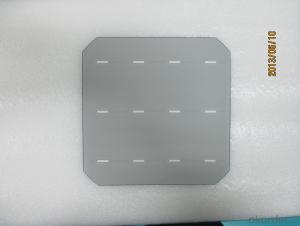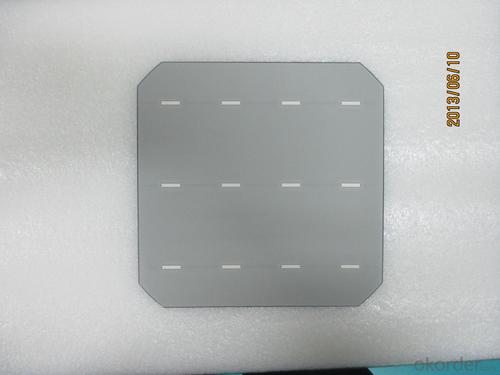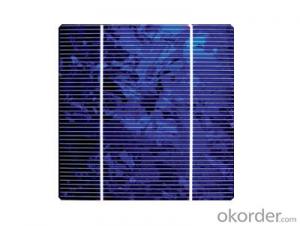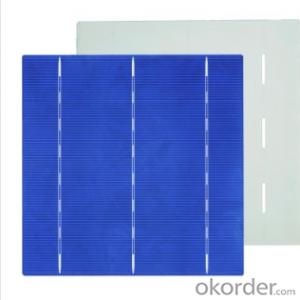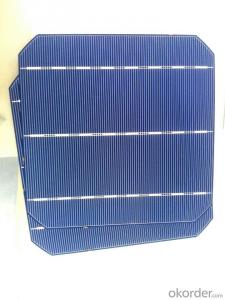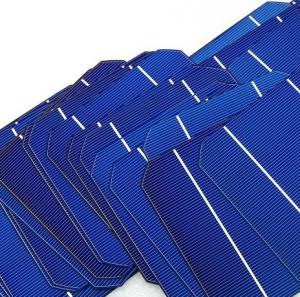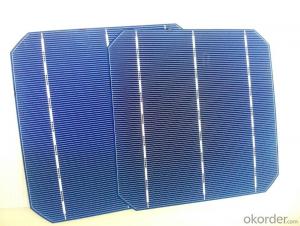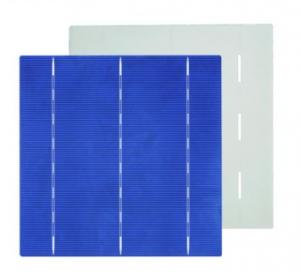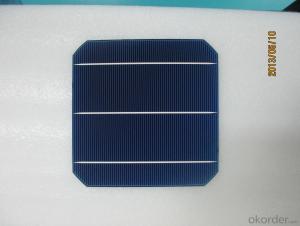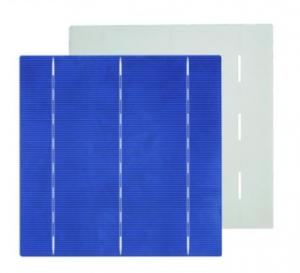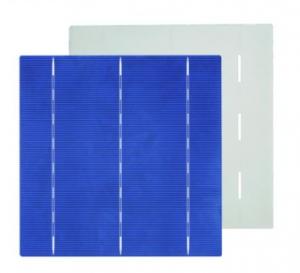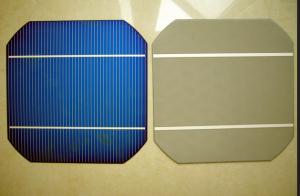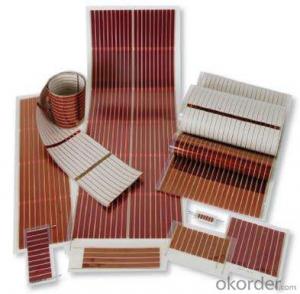Hot Solar Cells - Monocrystal Solar Energy Cell 156*156mm with 18.3% Efficiency
- Loading Port:
- China Main Port
- Payment Terms:
- TT or LC
- Min Order Qty:
- -
- Supply Capability:
- 1000000 PCS/month
OKorder Service Pledge
OKorder Financial Service
You Might Also Like
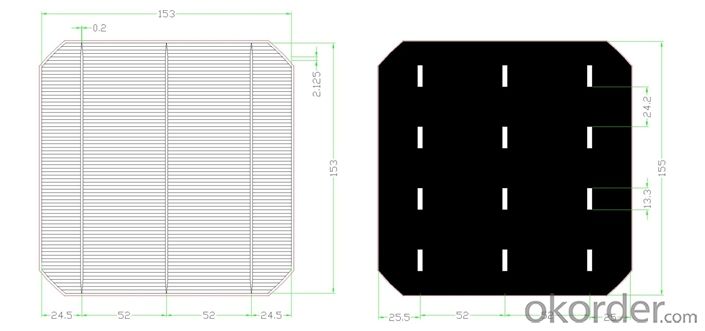
Monocrystal Solar Energy Cell
type:156M
appearance:156×1565㎜±0.5mm;diagonal:R=100mm
Main fence wide:1.4-1.5mm back electrode wide:2-2.5mm
Fence line qty:90
Cell thickness:220um±20um
Eff(%) | 18.00- 18.10 | 18.10- 18.20 | 18.20- 18.30 | 18.30- 18.40 | 18.40- 18.50 | 18.50- 18.60 | 18.60- 18.70 | 18.70- 18.80 | 18.80- 18.90 | 18.9- 19.0 | 19.1- 19.1 | 19.1- 19.2 |
Pm(W) | 4.30 | 4.33 | 4.35 | 4.37 | 4.40 | 4.42 | 4.44 | 4.47 | 4.49 | 4.52 | 4.54 | 4.56 |
Isc(A) | 8.71 | 8.73 | 8.76 | 8.77 | 8.78 | 8.82 | 8.83 | 8.85 | 8.86 | 8.88 | 8.9 | 8.93 |
Im(A) | 8.19 | 8.21 | 8.24 | 8.26 | 8.30 | 8.33 | 8.35 | 8.39 | 8.42 | 8.45 | 8.47 | 8.51 |
Voc(V) | 0.630 | 0.631 | 0.632 | 0.633 | 0.634 | 0.634 | 0.635 | 0.636 | 0.637 | 0.637 | 0.638 | 0.64 |
Vm(V) | 0.527 | 0.528 | 0.529 | 0.531 | 0.531 | 0.532 | 0.534 | 0.534 | 0.535 | 0.536 | 0.537 | 0.538 |
FF(%) | 78.6 | 78.7 | 78.8 | 79.0 | 79.2 | 79.3 | 79.5 | 79.6 | 79.8 | 80 | 80 | 80 |

remark:our company cells as per working current concentrate principle,separate the first and the second grade
Applications of Polycrystalline Solar Cells
Assemblies of photovoltaic cells are used to make solar modules which generate electrical power from sunlight, as distinguished from a "solar module" or "solar panel". A solar array generates solar power using solar energy.
Factory Picture of Solar Cells
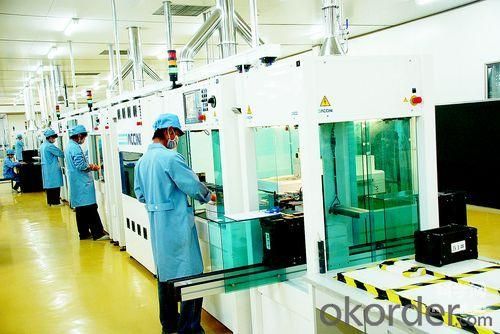
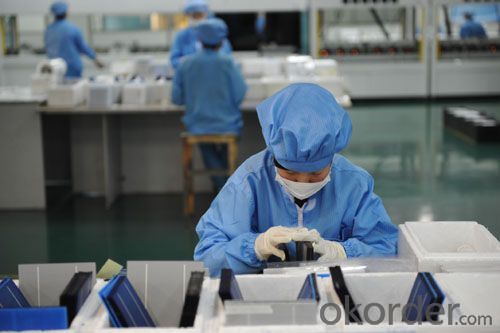
FAQ
We have organized several common questions for our clients,may help you sincerely:
What’s price per watt?
A: It’s depends on the quantity, delivery date and payment terms of the order. We can talk further about the detail price issue. Our products is high quality with lower price level.
Can you tell me the parameter of your solar cells?
We have different series of cells with different power output, both from c-si to a-si. Please take our specification sheet for your reference.
How do you pack your products?
We have rich experience on how to pack the panels to make sure the safety on shipment when it arrives at the destination.
Can you do OEM for us?
Yes, we can.
How long can we receive the product after purchase?
In the purchase of product within three working days, We will arrange the factory delivery as soon as possible. The perfect time of receiving is related to the state and position of customers. Commonly 7 to 10 working days can be served.
- Q: How do solar cells perform in areas with high humidity?
- Solar cells perform slightly less efficiently in areas with high humidity due to the presence of water vapor in the air, which can reduce the amount of sunlight reaching the cells and increase the chances of dust and dirt accumulation. However, advancements in solar cell technology have made them more resistant to humidity, and their performance is still considerable in such areas.
- Q: Can solar cells be used for powering medical devices?
- Yes, solar cells can be used for powering medical devices. Solar cells convert sunlight into electricity, which can be utilized to power various medical devices such as portable monitors, insulin pumps, hearing aids, and even prosthetic limbs. This renewable energy source allows for greater portability and independence, especially in remote or resource-limited areas where access to electricity may be limited.
- Q: What is the impact of hailstorms on solar cells?
- Hailstorms can have a significant impact on solar cells. The high-speed impact of hailstones can cause physical damage, such as cracks or fractures, to the surface of solar panels. This can result in reduced efficiency and output of the affected solar cells. Additionally, hailstorms can also damage the protective layers on solar panels, increasing the risk of moisture ingress and potential corrosion. Therefore, hailstorms pose a potential threat to the durability and performance of solar cells.
- Q: Are solar cells affected by extreme temperatures?
- Yes, solar cells are affected by extreme temperatures. High temperatures can cause the efficiency of solar cells to decrease, as the excess heat can reduce their ability to convert sunlight into electricity. Conversely, extremely cold temperatures can also impact the performance of solar cells, although to a lesser extent. It is important to note that modern solar cell designs often incorporate measures to mitigate the effects of temperature, such as using materials that can withstand extreme conditions.
- Q: What are the advantages of monocrystalline silicon and polycrystalline silicon in solar power?
- and the production process of polysilicon can be achieved by casting method and direct solidification method. Grain size of the grain size of centimeters; [4] due to nearly a decade of monocrystalline silicon technology research and development soon, in which the process is also used in the production of polycrystalline silicon cells, such as the choice of corrosion emission junction, back surface field, , Surface and body passivation, fine metal gate electrode, the use of screen printing technology can reduce the width of the gate electrode to 50 microns, the height of 15 microns or more, rapid thermal annealing technology for polysilicon production can greatly shorten the process time,
- Q: Can solar cells be installed on sloped surfaces?
- Yes, solar cells can be installed on sloped surfaces. In fact, sloped surfaces can often be advantageous for solar panel installation as they allow for better sun exposure and increased energy generation.
- Q: What is the impact of dust storms on solar cell efficiency?
- Dust storms can significantly reduce solar cell efficiency by blocking sunlight and accumulating dust particles on the surface of the cells. The dust particles act as a barrier, preventing sunlight from reaching the cells and reducing their ability to generate electricity. This can lead to a decrease in power output and overall efficiency of the solar panels. It is essential to regularly clean and maintain the solar panels to mitigate the negative impact of dust storms and ensure optimal performance.
- Q: How do solar cells perform in high altitude locations?
- Solar cells tend to perform better in high altitude locations due to the thinner atmosphere. With less air to scatter and absorb sunlight, solar cells can capture more solar radiation, resulting in increased energy production. Additionally, the lower temperatures at higher altitudes can also enhance the efficiency of solar cells.
- Q: How do solar cells perform in high humidity environments?
- Solar cells typically perform well in high humidity environments. However, excessive moisture or prolonged exposure to water can lead to a decrease in their efficiency. It is important to ensure proper waterproofing and maintenance of the solar panels to prevent any potential damage caused by moisture.
- Q: Can solar cells be used in large-scale power plants?
- Yes, solar cells can be used in large-scale power plants. In fact, large-scale solar power plants, also known as solar farms or solar parks, are becoming increasingly common as the technology improves and costs decrease. These power plants consist of a large number of solar panels or solar arrays that convert sunlight into electricity on a massive scale.
Send your message to us
Hot Solar Cells - Monocrystal Solar Energy Cell 156*156mm with 18.3% Efficiency
- Loading Port:
- China Main Port
- Payment Terms:
- TT or LC
- Min Order Qty:
- -
- Supply Capability:
- 1000000 PCS/month
OKorder Service Pledge
OKorder Financial Service
Similar products
Hot products
Hot Searches
Related keywords
